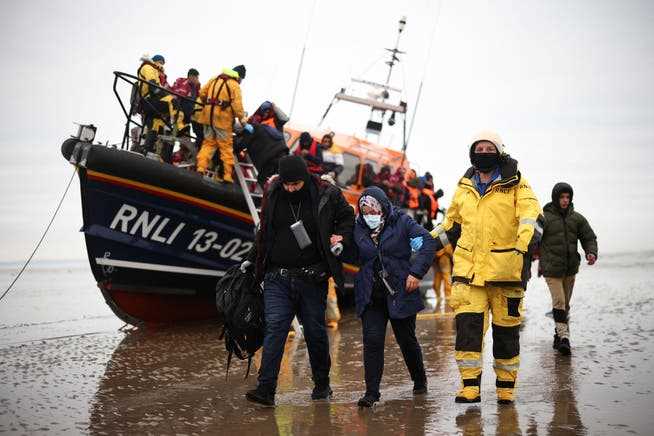Six weeks before the local elections, Boris Johnson is launching a spectacular attempt to curb migration across the English Channel. Some of the arrivals should expect to land in East Africa instead of on the British Isles.
A British Coastguard vessel brings migrants from the English Channel to the Port of Dover.
For years, the British government has been trying to outsource the examination of asylum procedures to territories or states outside of Europe. So far, however, the efforts have not been crowned with success, just like the EU’s search for extraterritorial asylum centers, since no state wanted to take asylum seekers from Europeans. But now Boris Johnson’s government has pulled off a coup: Interior Minister Priti Patel signed an agreement with Rwanda in Kigali on Thursday. This stipulates that some of the migrants arriving irregularly in Great Britain will be deported to the East African country 6600 kilometers away – with no prospect of returning to the United Kingdom.
Record high migration figures in the English Channel
Speaking in Lydd, Kent, Johnson said he wanted to stem the ongoing flow of boat migrants arriving from France. A record 28,500 asylum seekers crossed the Channel last year. In the current year there were already around 5000. In 2021, more than two-thirds of all asylum seekers in the UK were able to make legitimate claims for protection.
Now the Navy should ensure that all boat migrants are registered. The government then wants to carry out a superficial triage. She wants to immediately put some of the arrivals on a plane and fly them to Rwanda, although only men will be affected in a pilot phase. Those who can stay in Britain should be accommodated in camps. The new regime will potentially apply to all asylum seekers who have arrived since the beginning of the year.
The first arrivals are to be accommodated in Kigali in a hostel with 50 double rooms and receive three meals a day, leaving the hotel as they please. Further accommodations are being sought. The Rwandan authorities are to examine applications for asylum for around three months. Those who receive asylum should be allowed to settle permanently in the East African country. All others are threatened with deportation to their home country.
Rwanda will receive £120 million for the pilot phase. According to the British media, the country is said to have an interest in working with asylum seekers to counteract the emigration of young workers. It was initially not known whether the long-term ruler Paul Kagame would allow the cooperation with the British to be remunerated in another way.
Tightening of the asylum law
The program is intended to complement the Nationality and Borders Bill, which is pending in Parliament and is raising rule of law concerns in the House of Lords. According to the draft law, anyone who enters the UK legally should still be able to get asylum. Anyone who crosses the English Channel irregularly should only be able to receive subsidiary protection – without long-term residence status. According to Johnson, the risk of ending up in Rwanda should increase the deterrent effect of the law.

The number of boat migrants keeps breaking new records: helpers from the Royal National Lifeboat Institution bring migrants ashore in Dungeness.
The Prime Minister praised the pact with Rwanda as an “international prototype” for dealing with global migration flows and defended the plans against criticism from human rights organizations: the situation on the English Channel had become intolerable and Rwanda was a safe country. Addressing conservative critics, he explained that it was simply not practicable to push the boats back to France. An agreement with Paris and the EU has not yet been realized.
Legal and logistical hurdles
However, it will probably take some time before asylum seekers from Great Britain arrive in Rwanda. Johnson acknowledged that the pact is likely to end up in the courts. As Peter Walsh from the Oxford University Migration Observatory explains when asked, the Refugee Convention does not provide for a direct obligation to grant asylum seekers protection in the country of their arrival. However, complaints of discrimination or inhuman treatment could be brought. In 2021, Great Britain criticized Commonwealth member Rwanda at the UN Human Rights Council in Geneva and called for investigations into allegations of extrajudicial executions, deaths in custody and torture.
Even if the program, which has parallels with Australia’s offshore centers in Nauru and Papua New Guinea, survives all lawsuits, Walsh said logistical and financial challenges remain. Great Britain will have to ensure that asylum seekers in Rwanda receive legal and health care. According to Walsh, Australia has shown that housing asylum seekers offshore is 800 times more expensive than conducting the procedures in-country.
What is the deterrent effect?
Johnson recalled Britain’s humanitarian tradition for dissidents and refugees. This continues to apply to all those who use legal entry routes. However, humanitarian visa programs are currently only available for Hong Kongers, Afghans and Ukrainians. Refugees from other countries can only enter the country illegally by entering under false pretenses or by choosing an irregular route.
It therefore remains to be seen to what extent the pact with Rwanda can really reduce migration across the English Channel. The decisive factor is probably the number of asylum seekers who are effectively sent to East Africa. Johnson spoke of “tens of thousands in the coming years”. But in the short term, capacities are likely to be limited to a few hundred. Considering that almost 29,000 boat migrants crossed the English Channel in 2021, a number of people should still have a good chance of being able to stay in Great Britain.
Opposition leader Keir Starmer criticized the plans as “outrageous” and “unrealizable” and spoke of a distraction from the party affair. What is certain is that six weeks before the important local elections, Johnson has sent a new clear signal to the population that his government has not forgotten the Brexit promise to control migration flows.
